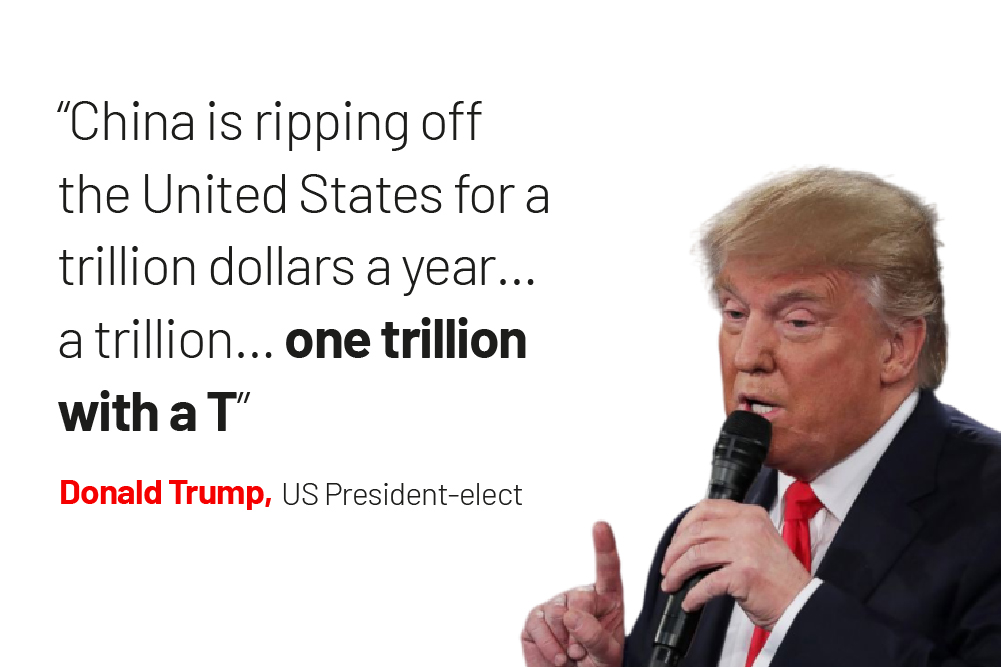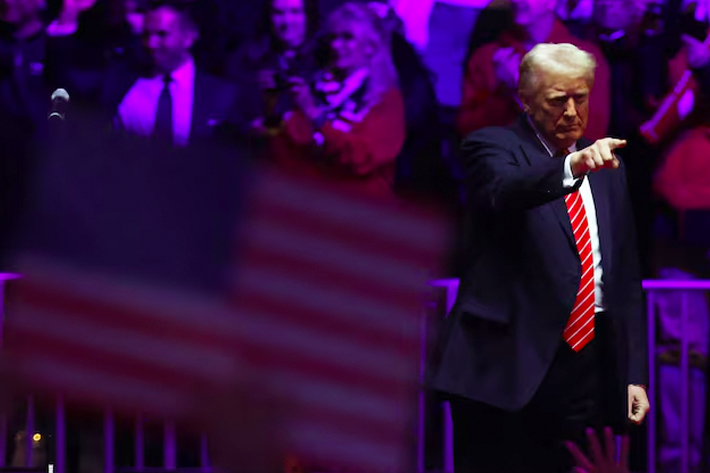Beijing officials are hoping for ‘a new start’ to ties with the United States following the inauguration of Donald Trump as president on Monday, even as Chinese business prospects remain clouded with fears of another bruising trade war.
China’s foreign ministry spokesperson Mao Ning said Beijing was “ready to properly manage differences with the new US administration,” at a regular press briefing on Monday.
When asked about Beijing’s expectations for the new US administration, she referred to “a new starting point” in China-US ties.
Also on AF: China’s Young Adults Focused on Saving, as Economy Cools
Mao’s remarks — made hours prior to Trump’s inauguration — come at a time when US-China ties are frazzled by an intense tech rivalry and concerns about the future of trade between the world’s two biggest economies.
Trump has, in the past, threatened to impose tariffs of more than 60% on China, saying the country owes America trillions of dollars.
At the same time, he has spoken of bonhomie with Chinese president Xi Jinping and also — for the time being — averted a ban in the US of the wildly popular China-owned app TikTok.
A range of developments in recent days paint a similarly mixed future for China-US ties.
On Friday, for instance, Trump said he had a good discussion with Chinese leader Xi Jinping on a number of issues, including trade, fentanyl and TikTok.
“The call was a very good one for both China and the USA. It is my expectation that we will solve many problems together, and starting immediately. We discussed balancing Trade, Fentanyl, TikTok, and many other subjects,” Trump wrote in a post on his social media platform Truth Social.
“President Xi and I will do everything possible to make the World more peaceful and safe!” Trump wrote.

Later, on Saturday, The Wall Street Journal reported that Trump has told advisers he wants to travel to China after he takes office.
And then, at his pre-inauguration rally on Sunday, Trump also vowed to “save” TikTok, promoting the app to restore its US services.
But, in a post on Truth Social, Trump later went on to say he “would like the United States to have a 50% ownership position in a joint venture” with TikTok.
That proposal received a cold response from Beijing, which said companies should “decide independently” on matters of their operations and deals.
Making inroads with Trump
Amid all of that, meanwhile, China is continuing efforts to make inroads with Trump.
Over the weekend top Chinese official, Vice President Han Zheng, met with billionaire Trump aide Elon Musk and Vice President-elect JD Vance, while also holding talks with US businesses.
Han is in the US to attend Trump’s inauguration, in place of Xi, a gesture of goodwill given that China was only represented by its ambassador at the previous two US presidential inaugurations.
Vance and Han discussed an array of topics including fentanyl, balancing trade and regional stability, the Trump-Vance transition team said in a statement.

Meanwhile, during his meeting with Musk, Han told the Tesla CEO he “welcomed” the EV-maker “and other US companies to seize the opportunities and share in the benefits of China’s development, and contribute to the growth of China-US economic and trade relations.”
Han’s meeting with US businesses included the heads of eight American firms from a range of industries including technology, banking and logistics, according to an executive in the room, who added that the meeting over-ran its allotted time and was very cordial.
“(Han Zheng) is seen as someone, because of his time in Shanghai, who understands the concerns of the foreign business community, he understands the economy,” Michael Hart, president of the American Chamber of Commerce in China, told Reuters in Beijing.
“It’s a nice fig leaf, or whatever you want to call it, so that’s positive.”
Business prospects clouded with fear
Still, despite all the bonhomie, a sense of deja vu lingers among those who remember how quickly China-US ties deteriorated during Trump’s first term. And those with the worst memories of that trade war are Chinese businesses.
“From now on, until the situation becomes a little bit clearer, all our US clients have to pay in advance,” said Dominic Desmarais, chief solutions officer at Lira Solutions, a Suzhou-based firm that connects Chinese manufacturers with overseas buyers of everything from toys to furniture and titanium products.
“If Donald Trump actually imposes 40%, or whatever, duties on Chinese products coming into the United States, I don’t want to be stuck with custom-made goods for specific clients that just disappear,” he added.
“That happened a lot, seven, eight years ago, when Donald Trump put 25% duties on 85% of the commodities coming out of China.”
The cautious approach of Chinese businesses has been hardened by the fact that world’s second-largest economy is now far more vulnerable to Trump tariffs. The country is grappling with spiralling deflation, an unending property crisis, huge local government debt and 16% youth unemployment, among other challenges.
“What I can see is that China’s economy is not very good at the moment, due to the impact of the pandemic, and (the fact that) Trump himself is a crazy, wild person (doesn’t help matters on our side),” said a Beijing resident surnamed Wang, 36.
“The pressure still remains quite big (for us).”
- Reuters, with additional editing and inputs from Vishakha Saxena
Also read:
Trump Says He And China’s Xi Will Likely ‘Get Along Very Well’
Trump Planning to Clamp Down on Chinese EV Supply Chains
China Seen Taking on More Debt to Counter Trump Tariffs
China Central Bank ‘to Allow a Weaker Yuan’ as Trade Risk
Chinese Media to Trump: ‘There Are No Winners in Tariff Wars’
China ‘Keen For Talks on Trade Deal to Reduce Tariffs Threat’
Economists Say Trump Won’t Hit China With 60% Tariffs Early On
Retaliatory Trade Tariffs Could Backfire on Asia, IMF Warns
Trump’s Plan to Kill EV Tax Credits ‘Could Benefit China’
In U-Turn, Elon Musk Says US Tariffs on Chinese EVs ‘Not Good’
US-Sanctioned Oil Tankers Banned at Key Eastern China Ports
Overseas Investors Quit Asian Equities After Trump’s Poll Win
What Will Donald Trump Mean For Global Carbon Markets?
























